Current Courses
What is GSLL offering this semester?
Every semester GSLL offers undergraduate students:
- First-Year Seminars;
- Beginning, Intermediate, and Advanced Language Courses;
- English-Language Seminars and Lectures on Language, Linguistics, Literature, Film, Philosophy, and Culture;
- Language, Linguistics, Literature, Film, Philosophy, and Culture Seminars taught in the Target Language;
- Individual Seminars on Independent Readings;
- Honors Thesis Mentoring.
GSLL also offers every semester for graduate students German- and English-language courses in Literature, Linguistics, Theory, Film & Media Studies.
The following catalogue of current courses is organized according to language and level.
In the event you have questions, contact the director of undergraduate or graduate studies.
SPRING 2024 COURSE DESCRIPTIONS

GSLL 54 First-Year Seminar: Once upon a Fairy Tale: Fairy Tales and Childhood, Then and Now.
Fairy tales from different national traditions and historical periods read through various critical lenses, against a backdrop of changing historical conceptions of the child. Works from Grimm, Anderson, Dahl, Disney, etc.
Readings and discussions in English.
Making Connections: LA, NA.
Students may not receive credit for both GSLL 54 and GERM 279/CMPL 279.
Downing. TTH 11:00 AM – 12:15 PM.

GSLL 59 First-Year Seminar: Moscow 1937: Dictatorships and Their Defenders.
A study of recurrent problems of enormous consequence:
The origins and emergence of dictatorships that engage in grievous practices of repression and mass murder;
In what ways these regimes are understood, and by whom, as they develop and “mature“ – philosophically, ideologically, historically;
And how such regimes tend often to be enveloped in rationalizations that facilitate their continuing existence. The Soviet Union, particularly during the 1930s and the blood purges, serves as the axis. However, a main objective is to use this “case study” to branch off into different directions of student inquiry.
Readings and discussions in English.
Making Connections: HS, GL.
Pike. TTH 2:00 PM – 3:15 PM.

GSLL 80 First-Year Seminar: Not Just Dogs: Animals in Russian Literature.
This seminar explores the “question of the animal” in the works of major Russian writers (Gogol, Dostoevsky, Tolstoy, Turgenev, Chekhov, Platonov). Among the topics to be discussed are:
The animal as the other;
Animal and human natures;
Dominance and submission;
Ethics of human/animal relations;
And the trope of “talking” animals.
Readings and discussions in English.
IDEAs in Action: FC-AESTH or FC-PAST.
Making Connections: LA, BN.
Lapushin. TTH 3:30 PM – 4:45 PM.

GSLL 89 First-Year Seminar: Language, Migration, Identity.
In this course, students will examine the intricate connections between language, histories of migration, and processes of identity formation as depicted in literary works, films, and visual artworks by German authors with a history of migration or exile.
In addition to readings by authors with Japanese, Eastern-European, Jewish, Turkish, and African backgrounds in Germany, we will also watch films, engage with visual artworks, visit the Ackland Museum, and learn about community engagement with immigrant and refugee communities here at home through the Town of Chapel Hill’s Language Access Program and the New Roots Oral History Project at UNC Chapel Hill.
Readings and discussions in English.
IDEAs: FC-Global or FC-AESTH.
Aksin. MWF 1:25 PM – 2:15 PM.
Beginning, Intermediate, and Advanced Language Courses

BCS 402 Elementary Bosnian-Croatian-Serbian Language II.
Continuation of the proficiency-based instruction in BCS 401. The course emphasizes speaking, listening, reading, writing in a cultural context. Students enhance their basic vocabulary and grammar and will regularly communicate in the target language about everyday topics.
Prerequisite, BCS 401; permission of the instructor for students lacking the prerequisite.
Dzumhur. TH 11:00 AM – 12:15 PM.

CZCH 402 Elementary Czech II.
Continuation of the proficiency-based instruction in CZCH 401. The course emphasizes speaking, listening, reading, writing in a cultural context. Students enhance their basic vocabulary and grammar and will regularly communicate in Czech about everyday topics.
Prerequisite, CZCH 401; permission of the instructor for students lacking the prerequisite.
Piskacova. MWF 9:05 AM – 9:55 AM.

DTCH 403 Intermediate Dutch.
A continuation of DTCH 402, building on the essential elements of the Dutch language, focusing on grammar, reading, writing, and conversational skills. Emphasis on reading and discussion of longer texts.
Completion of DTCH 403 fulfills level 3 of a foreign language.
Prerequisite, DTCH 402; permission of the instructor for students lacking the prerequisite.
Thornton. MWF 2:30 PM – 3:20 PM.
GERM 101 Elementary German I.
Develops the four language skills (speaking, listening, reading, writing) in a cultural context. In addition to mastering basic vocabulary and grammar, students will communicate in German about everyday topics.
001: Staff. MW 10:10 AM – 11:00 AM and TTH 10:00 AM – 10:50 AM.
003: Staff. MW 11:15 AM – 12:05 PM and TTH 11:05 AM – 11:55 AM.
GERM 102 Elementary German II.
This continuation of GERM 101 emphasizes speaking, listening, reading, and writing in a cultural context. Students enhance their basic vocabulary and grammar and will regularly communicate in German about everyday topics.
Prerequisite, GERM 101; permission of the instructor for students lacking the prerequisite.
001: Staff. MW 10:10 AM – 11:00 AM and TTH 10:00 AM – 10:50 AM.
002: Staff. MW 11:15 AM – 12:05 PM and TTH 11:05 AM – 11:55 AM.
004: Staff. MW 12:20 PM – 1:10 PM and TTH 12:30 PM – 1:20 PM.
005: Staff. MW 1:25 PM – 2:15 PM and TTH 1:30 PM – 2:20 PM.
GERM 203 Intermediate German I.
Students acquire necessary materials and opportunities to develop further their language skills in a cultural context. They review and expand upon the basic grammar covered in beginning German.
Prerequisite, GERM 102; permission of the instructor for students lacking the prerequisite.
001 Askin. MWF 10:10 AM – 11:00 AM.
002 Askin. MWF 11:15 AM – 12:05 PM.
003 Staff. MWF 1:25 PM – 2:15 PM.
GERM 204 Intermediate German II.
Emphasizes further development of the four language skills (speaking, reading, writing, listening) within a cultural context. Discussions focus on modern Germany, Austria, and Switzerland in literature and film.
Prerequisite, GERM 203; permission of the instructor for students lacking the prerequisite.
001 Strietholt. MWF 10:10 AM – 11:00 AM.
002 Strietholt. MWF 11:15 AM – 12:05 PM.

GERM 301 Advanced Applied German: Life, Work, Fun.
Introduction to present-day German-speaking societies with an emphasis on practical contexts of everyday life (business, media, culture). The course initiates a sustained reflection on class, gender, race, and political economy and prepares students for studying and interning in German-speaking Europe.
Improve your discussion and presentation skills in German.
Broaden your vocabulary.
Review and practice German grammar.
Read and interpret an array of texts.
Practice writing in different genres.
Course conducted in German.
IDEAs in Action: FC-GLOBAL or FC-KNOWING, COMMBEYOND.
Making Connections: NA, CI.
Prerequisite, GERM 204; permission of the instructor for students lacking the prerequisite.
Jones. MWF 2:30 PM – 3:20 PM.

GERM 302 Advanced Communication in German: Media, Arts, Culture.
Introduction to contemporary German society, emphasizing sustained reflection on family structures, class, gender, race, demography, and the political economy of present-day Germany. Emphasis is on advanced communication and writing based on shorter readings from contemporary life and culture in German-speaking societies. The readings provide subject matter for in-class discussion and regular written compositions that explore a variety of practical genres (report, article, essay).
Course conducted in German.
IDEAs in Action: FC-GLOBAL, COMMBEYOND.
Making Connections: NA, SS, CI.
Prerequisite, GERM 204; permission of the instructor for students lacking the prerequisite.
Nester. TTH 11:00 AM – 12:15 PM.
.

GERM 305 Business German.
Get your WiDaF (Business German Certificate!)
As a continuation of GERM 304 the course offers a more advanced treatment of the current German economic and business debates and events while further strengthening relevant German language skills.
Course conducted in German.
IDEAs in Action: FC-Global, COMMBEYOND.
Making Connections: NA.
Prerequisite, GERM 204; permission of the instructor for students lacking the prerequisite.
GERM 304 recommended but not required.
Same as: BUSI 305.
Strietholt. MW 3:35 PM – 4:50 PM.

PLSH 402 Elementary Polish II.
Continuation of the proficiency-based instruction in PLSH 401. The course emphasizes speaking, listening, reading, and writing in a cultural context. Students enhance their basic vocabulary and grammar and will regularly communicate in Polish about everyday topics.
Prerequisite, PLSH 401; permission of the instructor for students lacking the prerequisite.
Majewska. MWF 10:10 AM – 11: 00 AM.
PLSH 404 Intermediate Polish II.
Continuation of the proficiency-based instruction begun in elementary Polish, continued.
Prerequisite, PLSH 403; permission of the instructor for students lacking the prerequisite.
Global Language: Level 4.
Majewska. MWF 9:05 AM – 9:55 AM.

RUSS 102 Basic Russian Communication II.
Further basics of Russian for everyday conversations. Continues to lay the foundation for development of four language skills (speaking, writing, listening, and reading) indispensable for communication on everyday topics in a variety of situational contexts. Fosters further interaction through acquisition of essential communicative and conversational strategies active in contemporary standard Russian through culturally relevant materials.
Prerequisite, RUSS 101; permission of the instructor for students lacking the prerequisite.
001: McGarry. MWF 10:10 AM – 11:00 AM and T 10:00 AM – 10:50 AM.
002: McGarry. MWF 11:15 AM – 12:05 PM and T 11:05 AM – 11:55 AM.
003: McGarry. MWF 1:25 PM – 2:15 PM and T 1:30 PM – 2:20 PM.

RUSS 204 Intermediate Russian Communication II.
Skills for fluent speaking, writing, listening, and reading for intermediate-to-advanced learners. Develops and deepens learners’ mastery of contemporary standard Russian. Stresses communication, individual expression, and fosters cultural sensitivity through systematic expansion of learners’ ability to conduct conversations in contemporary standard Russian on a widening variety of culturally relevant subjects.
Prerequisite, RUSS 203; permission of the instructor for students lacking the prerequisite.
Making Connections: BN, CI.
001: Chernysheva. MWF 10:10 AM – 11:00 AM.
002: Magomedova. MWF 1:25 PM – 2:15 PM.

RUSS 410 Intermediate-to-Advanced Russian Communication, Conversation, and Composition in Context II.
Hones skills necessary for advanced communication, conversation, and composition. Presents phonetics and grammar in contemporary cultural context. Learners expand their practical knowledge of contemporary standard Russian in the context of present-day culture, while developing applied skills pertaining to comprehension, production of, and communication in Russian actively using authentic cultural materials.
Course conducted in Russian.
IDEAs in Action: FC-GLOBAL.
Making Connections: BN.
Prerequisite, RUSS 409; permission of the instructor for students lacking the prerequisite.
001: Chernysheva. MWF 10:10 AM – 11:00 AM.
002: Chernysheva. MWF 1:25 PM – 2:15 PM.

RUSS 412 Advanced Communication, Conversation, and Composition in Contemporary Standard Russian II.
Prepares advanced learners of contemporary standard Russian for communication with educated native speakers of the language in the area of their professional competence. Further interactive skills for speaking, writing, listening, and reading in a variety of communicative situations pertaining to the learners’ professional expertise.
Course conducted in Russian.
Prerequisite, RUSS 411; permission of the instructor for students lacking the prerequisite.
Magomedova. MWF 9:05 AM – 9:55 AM.

RUSS 516 Advanced Russian Communication, Composition and Grammar in the Professions II.
A continuation of RUSS 515, RUSS 516 develops and maintains the linguo-cultural skills of advanced-to-professional learners by preparing them for professional study-abroad experiences at Russophone institutions of higher learning. A seminar-style course with rotating instructors, it engages learners in contemplation, research, and discussion of subjects within the instructor’s professional expertise.
Readings, viewing materials, and discussions in Russian.
IDEAs in Action: RESEARCH, COMMBEYOND.
Making Connections: BN, EE-Mentored Research.
Prerequisites, RUSS 515 or permission of the instructor for students lacking the prerequisite.
Chernysheva. MWF 11:15 AM – 12:05 PM.
Undergraduate English-Language Seminars & Lectures

GERM 215 Germanic Heroic Legend: Heros and Villains, Monsters and Marauders.
We shall examine representations of the warrior culture of the Germanic-language areas of the Atlantic North (Germany, Scandinavia, Anglo-Saxon England) from the Gallic Wars under Julius Caesar (58–50 BCE) through the Migration Age (ca. 300–600 CE). This period saw the emergence of the Germanic peoples upon the scene of recorded history followed by a progressively intrusive migratory movement that was one of the most fundamental ethnographic events in early European history. .
From a specimen of sagas, poems, historical documents, inscriptions, and visual art, we shall explore creation myths and mythic heroes, political and legal structures, cultural values, and the ethos of “might-makes-right.” We shall also examine retellings of heroic stories in modern film and literature and their relevance in contemporary society.
Course conducted in English.
IDEAs in Action: FC-AESTH
Roberge. TTH 2:00 PM – 3:15 PM.

GERM 280 20th-Century German Philosophy and Modern Youth Cultures.
This lecture investigates the contact points between 20th-century German philosophy and modern youth cultures and establishes how German philosophers thought through the possibilities, limitations and consequences of youth rebellion and conformity in ways that youth cultures themselves rarely did. Of particular concern will be youth culture’s triumvirate: Sex, drugs, and rock music. Students will read and discuss seminal texts by thinkers like Adorno, Arendt, Benjamin, Bloch, Gadamer, Habermas, Heidegger, Jaspers, Jonas, Marcuse, Nietzsche, Simmel, and Sloterdijk. In order to illuminate these philosophical readings, lectures will address a selection of American and British feature films portraying modern youth cultures.
Readings and class discussions in English.
Making Connections: PH, NA.
IDEAs in Action: FC-KNOWING or FC-VALUES.
Langston. MW 10:10 AM – 11:00 AM.
Recitation Required.
601: Staff. F 10:10 AM – 11:00 AM.
602: Staff. F 11:15 AM – 12:05 PM.
603: Staff. F 12:20 PM — 1:10 PM.
604: Staff. F 1:25 PM – 2:15 PM.
605: Staff. F 11:15 AM – 12:05 PM.
606: Staff. F 12:20 PM -– 1:10 PM.
Optional German-language discussion section! See GERM 388!

GSLL 225 Popular and Pious: Early Modern Jewish Literature.
This course studies Yiddish literature written during the fifteenth to eighteenth centuries to entertain and uplift European Jews. These texts provide valuable insights into the vibrant dynamics of Jewish society such as the growth of new roles for women, developments in education and changing ethical values, and responses to violent expulsions and to accusations of antisemitism.
Readings and class discussions in English.
IDEAs in Action: FC-PAST or FC-VALUES.
Making Connections: LA, NA, WB.
Same as: JWST 225.
Von Bernuth. TTH 12:30 PM – 1:45 PM.

GSLL 259 Ideology and Aesthetics: Marxism and Literature.
What is ideology and does it have an aesthetic? Is ideological literature exclusively limited to regimes that instrumentalize Marxism in the name of socio-political revolution? Or does the literature of Western democracies not also evince its own ideological aesthetic?
This course introduces students both to a world history of Marxist literature as well as to the long tradition of Marxist literary criticism. Marxist critics include: Barthes, Benjamin, Jameson, Lukács, Marx, Suvin, and Williams.
Readings and class discussions in English.
IDEAs in Action: FC-AESTH or FC-KNOWING.
Making Connections: HS, GL.
Same as: CMPL 259.
Jones. TTH 11:00 AM – 12:15 PM.

GSLL 274 Representing the Holocaust: Mediating Trauma in Art and Theory.
This course will explore artistic mediations of the Holocaust in literature, film, and beyond. It focuses on questions of representation, authenticity, appropriateness and uniqueness, the role of memory, the problems and limits of language in articulating the Shoah, and issues of trauma and justice.
Readings and class discussions in English.
IDEAs in Action: FC-AESTH or FC-PAST.
Same as: JWST 274.
Nester. TTH 2:00 PM – 3:15 PM.

GSLL 288 Graphic Medicine: The Intersection of Health and Comics.
This course engages with the Medical Humanities, seeking to bring together students of medicine along with students of the humanities to contemplate how we communicate physical and mental illness. We will explore the unique possibilities of comics in the form of graphic medicine: namely comics that thematize physical and mental health.
How do comic artists work through issues of trauma and pain?
How do artists with chronic illness and disabilities articulate their experience through comics?
How have attitudes towards physical and mental illness developed differently in Europe compared to the US?
We will explore these questions by reading comics from across Europe, including Spain, France, Germany and Sweden.
Readings and class discussions in English.
Making Connections: VP, NA.
Same as: CMPL 288.
Layne. TTH 3:30 PM – 4:45 PM.

GSLL 295 Research, Creativity, and Innovation in the Humanities.
This course serves as an introduction to research methodologies, theories, and the university resources available to students seeking to perform cutting-edge research in the humanities. The goal of the course is to produce a substantial research project. The capacities developed in this course as well as the project itself could be used as the basis for grants, scholarships, internship applications, or an honors thesis.
Taught in English.
Making Connections: CI, EE-Mentored Research.
Same as: CMPL 395, ROML 295.
Lopes de Almeida (professor in Romance Studies). MW 1:25 PM – 2:40 PM.

RUSS 279 Sunstrokes in Dark Alleys: Russian Short Stories.
An introduction to the Russian short story, focusing on the topic of love in all its intriguing aspects. The readings include works from the 18th century to the 20th.
Readings and discussions in English.
IDEAs in Action: FC-AESTH or FC-Past.
Making Connections: LA, BN.
Lapushin. TTH 12:30 PM – 1:45 PM.
Upper-Level Undergraduate Seminars taught in the Target Language
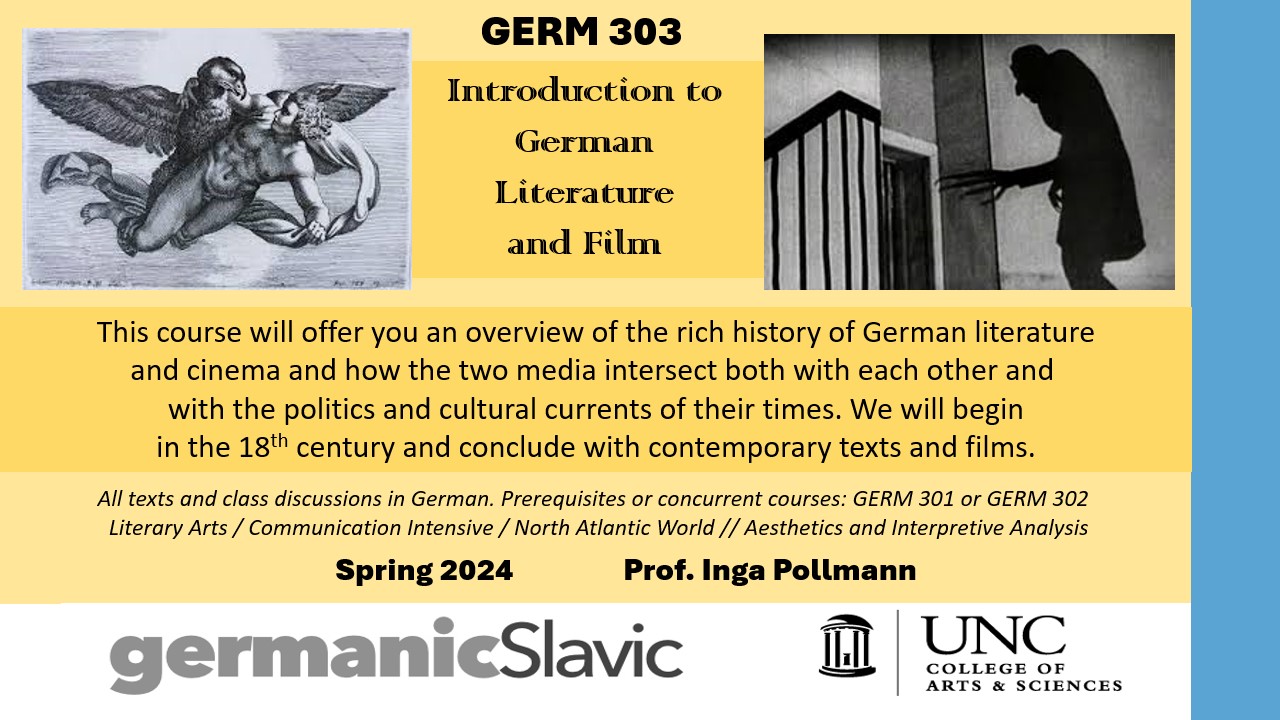
GERM 303 German Literature and Culture.
This course will offer you an overview of the rich history of German literature and cinema and how the two media intersect both with each other and with the politics and cultural currents of their times. We will begin in the 18th century and conclude with contemporary texts and films.
Readings, films, and class discussions in German.
IDEAs in Action: FC-AESTH.
Making Connections: LA, CI, NA.
Pre- or corequisite, GERM 301 or 302; permission of the instructor for students lacking the prerequisite.
001: Pollmann. TTH 12:30 PM – 1:45 PM.
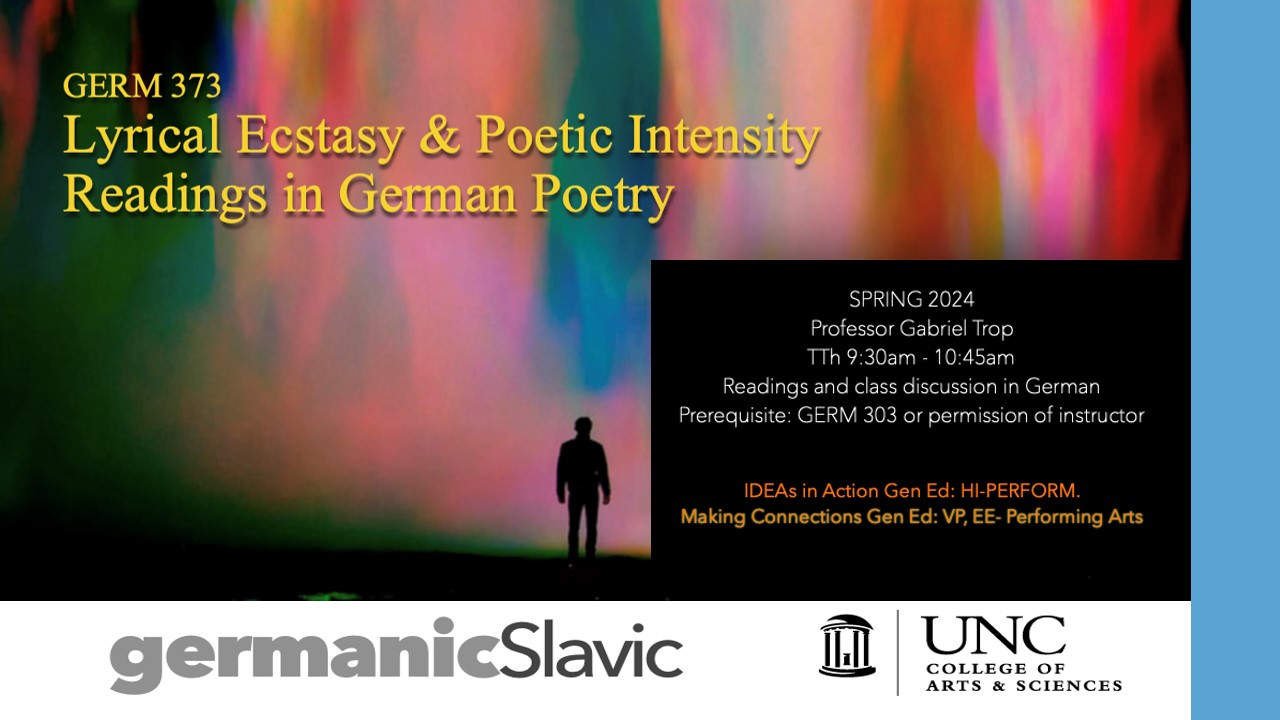
GERM 373 Lyrical Ecstasy and Poetic Intensity: Readings in German Poetry.
Survey of German lyric poetry from 18th to 21st century; major poets, forms, literary movements discussed. Culminates in a public recitation of German plays.
Readings, class discussions, and public recitation in German.
IDEAs in Action: HI-PERFORM.
Making Connections: VP, EE-Performing Arts.
Prerequisite, GERM 303; permission of the instructor for students lacking the prerequisite.
Trop. TTH 9:30 AM – 10:45 AM.

GERM 388 Discussion Section in German.
Students may enroll only in conjunction with GERM 280.
Optional German-language discussion section to accompany GERM 280: 20th-Century German Philosophy and Modern Youth Cultures. The class will meet once per week, for one credit hour.
All materials and discussions in German.
Prerequisite, GERM 204; permission of the instructor for students lacking the prerequisite.
Langston. F 12:20 PM – 1:10 PM.
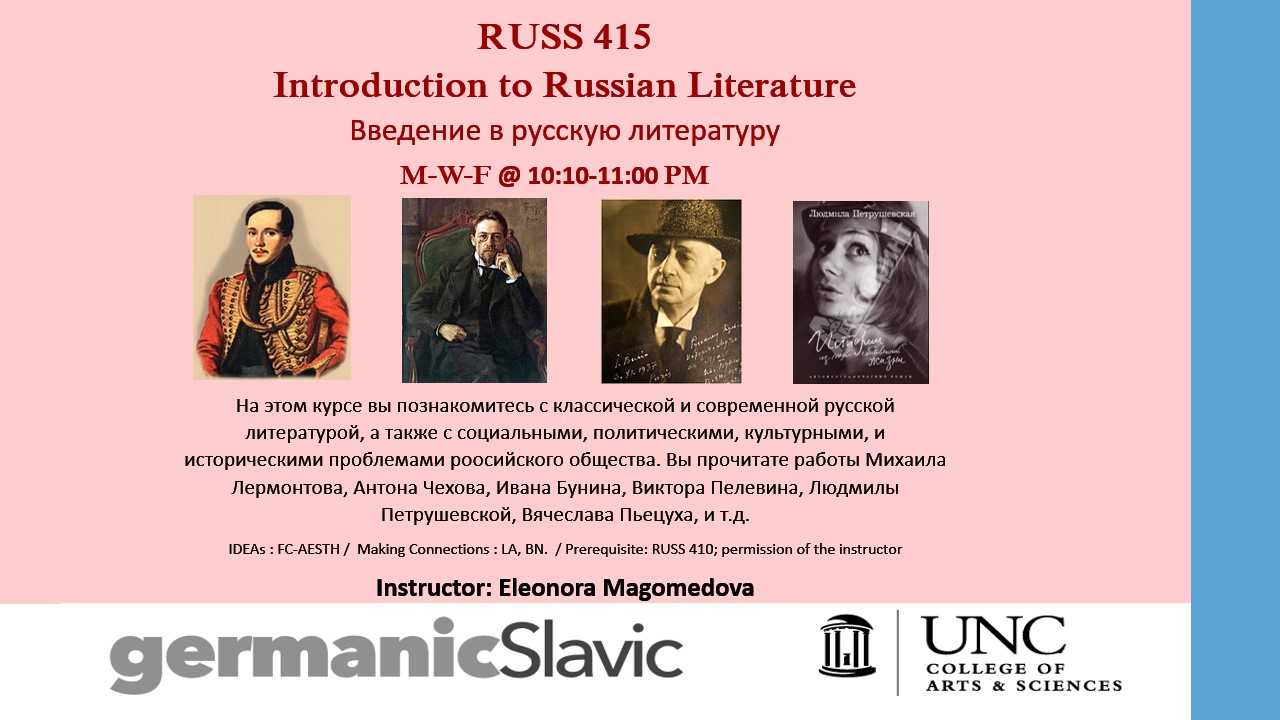
RUSS 415 Introduction to Russian Literature.
Reading and discussion of selected authors in Russian aimed at improving reading skill and preparing the student for higher level work in Russian literature.
Readings and class discussions in Russian.
Prerequisite, RUSS 410; permission of the instructor for students lacking the prerequisite.
IDEAs in Action: FC-AESTH.
Making Connections: LA, BN.
Magomedova. MWF 10:10 AM – 11:00 AM.
Dual-Level Seminars Taught in English
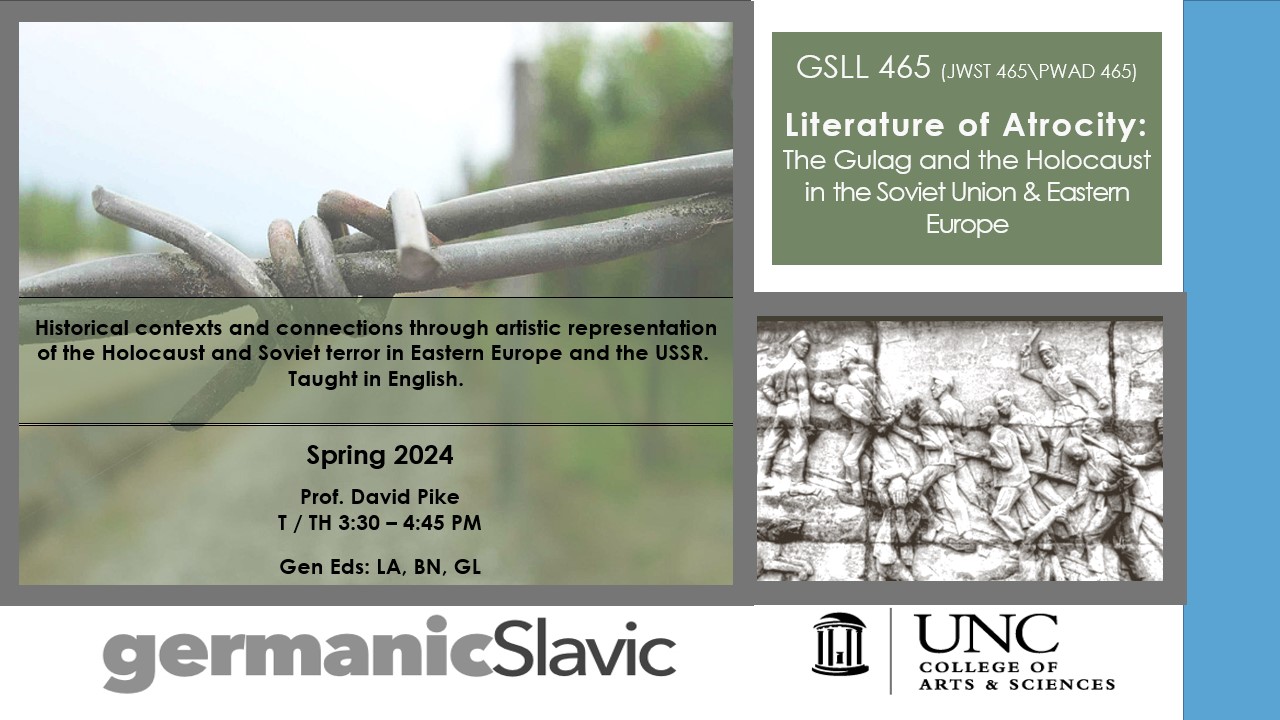
GSLL 465 Literature of Atrocity: The Gulag and the Holocaust in the Soviet Union and Eastern Europe.
Historical contexts and connections through artistic representation of the Holocaust and Soviet terror in Eastern Europe and the USSR.
Taught in English.
Making Connections: LA, BN, GL.
Same as: JWST 465, PWAD 465.
Pike. TTH 3:30 PM – 4:45 PM.

RUSS 455 20th-Century Russian Literature and Culture.
As Russia became a laboratory for sociopolitical experiments of global significance, its culture reflected on the most spectacular of its aspirations and failures. The course surveys 20th-century literary, musical and cinematic artifacts that emerged to affect the world profoundly.
Taught in English, some readings in Russian for qualified students.
IDEAs in Action: FC-Knowing.
Making Connections: LA, BN.
Shvabrin. TTH 3:30 PM – 4:45 PM.
Courses in Other Departments Taught by GSLL Faculty

CMPL 143 History of Global Cinema.
This course surveys the history and theory of global cinema from its beginning to the present. We will discuss films from a variety of historical, national, and social-political contexts, and we will do so both diachronically (historically) and synchronically (comparatively), regarding the development of film language, aesthetics, technology and politics over time, as well as the formation of national or cultural film styles, genres, cultures, and idioms. Thus, we will look at silent cinema in various national contexts, international melodrama in the late silent and early sound periods, the global rise of art cinema in the 1960s and ’70s, and recent transnational blockbusters as well as new national schools. By the end of the course, you should be able to understand the major debates about the meanings and functions of film, be conversant in the key terms of film analysis, be able to describe the historical and theoretical developments in national and global cinemas and be able to write comparatively about films with the precision and acuity required of film scholarship. .
Making Connections: VP, GL.
IDEAs in Action: FC-AESTH.
Pollmann. TTH 9:30 AM – 10:20 AM.
Recitation Required.
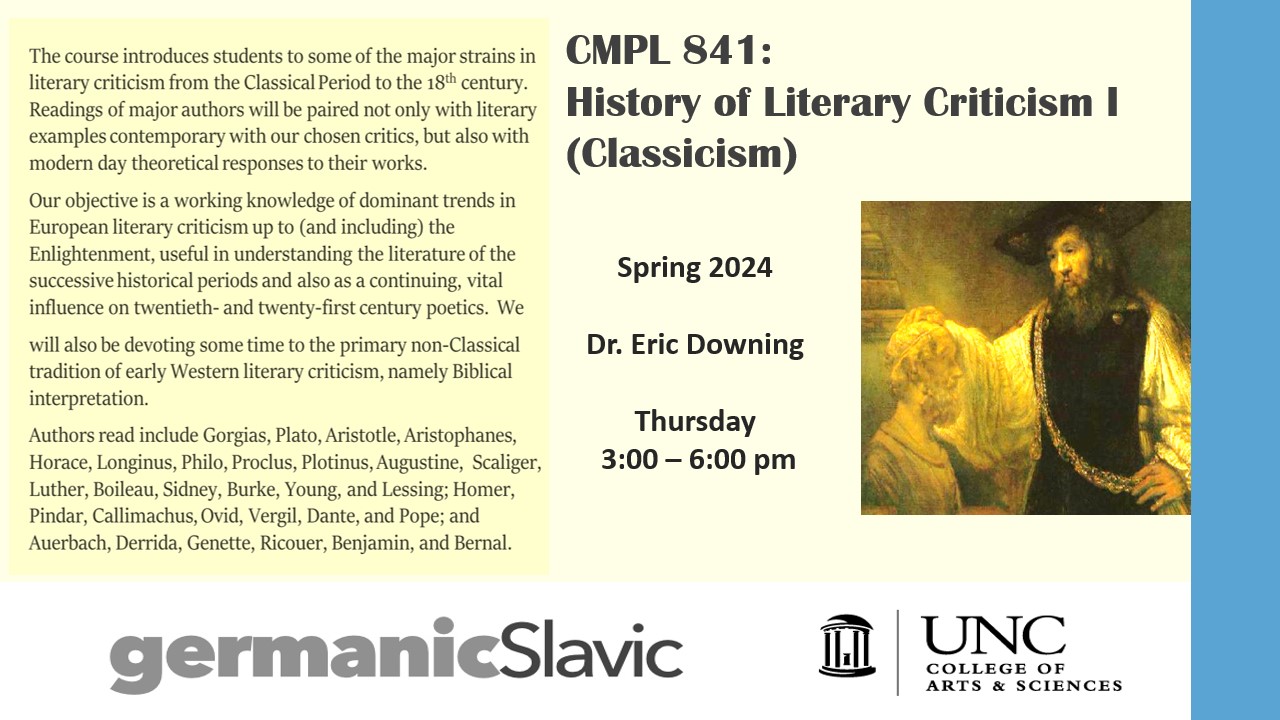
CMPL 841 History of Literary Criticism I: The Origins of Theory and Criticism.
The course introduces students to some of the major strains in literary criticism from the Classical Period to the 18th century. Readings of major authors will be paired not only with literary examples contemporary with our chosen critics, but also with modern day theoretical responses to their works.
Our objective is a working knowledge of dominant trends in European literary critics up to (and including) the Enlightenment, useful in understanding the literature of the successive historical periods and also as a continuing, vital influence on twentieth- and twenty-first century poetics. We will also be devoting some time to the primary non-classical tradition of early Western literary criticism, namely Biblical interpretations.
Authors read include Gorgias, Plato, Aristotle, Aristophanes, Horace, Longinus, Philo, Proclus, Plotinus, Augustine, Scaliger, Luther, Boileau, Sidney, Burke, Young, and Lessing; Homer, Pindar, Callimachus, Ovid, Virgil, Dante, and Pope; and Auerbach, Derrida, Genette, Ricoeur, Benjamin, and Bernal.
Downing. TH 3:00 PM – 6:00 PM.
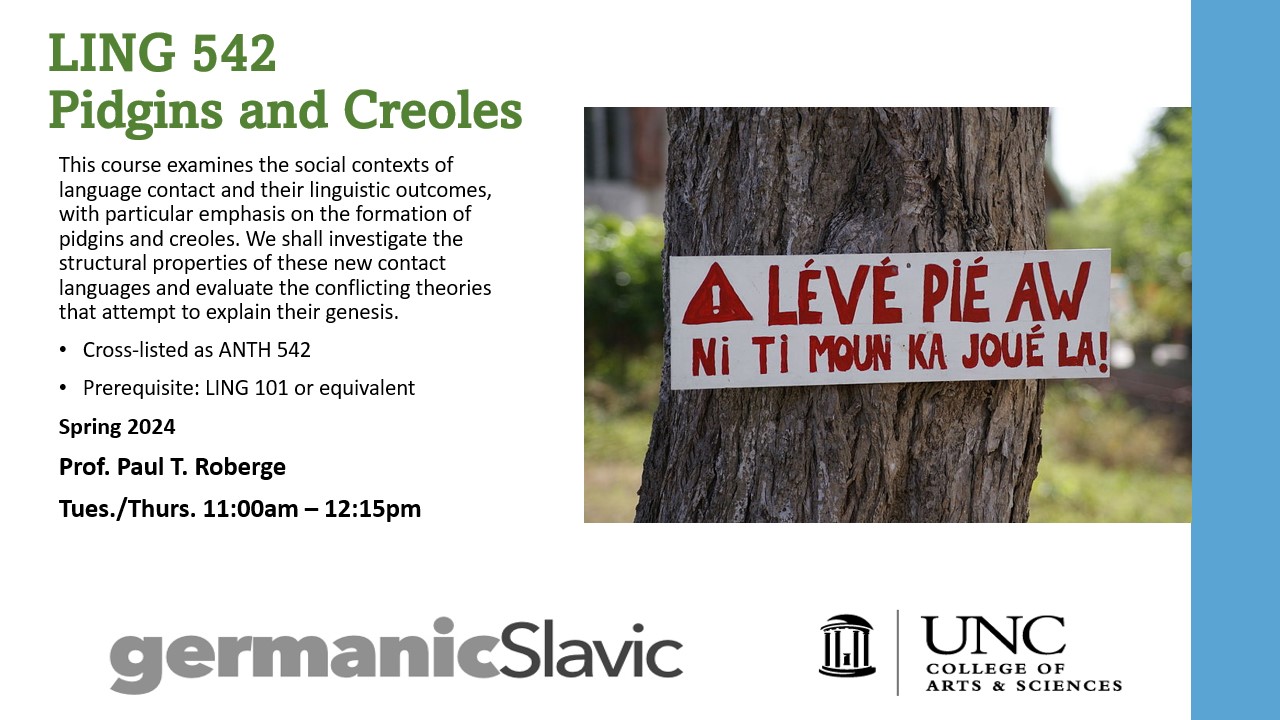
LING 542 Pidgins and Creoles.
This course examines the social contexts of language contact and their linguistic outcomes, with particular emphasis on the formation of pidgins and creoles. We shall investigate the structural properties of these new contact languages and evaluate the conflicting theories that attempt to explain their genesis.
Prerequisite, LING 101 or equivalent.
Same as: ANTH 542.
Roberge. TTH 11:00 AM – 12:15 PM.
Carolina-Duke Graduate Level Courses
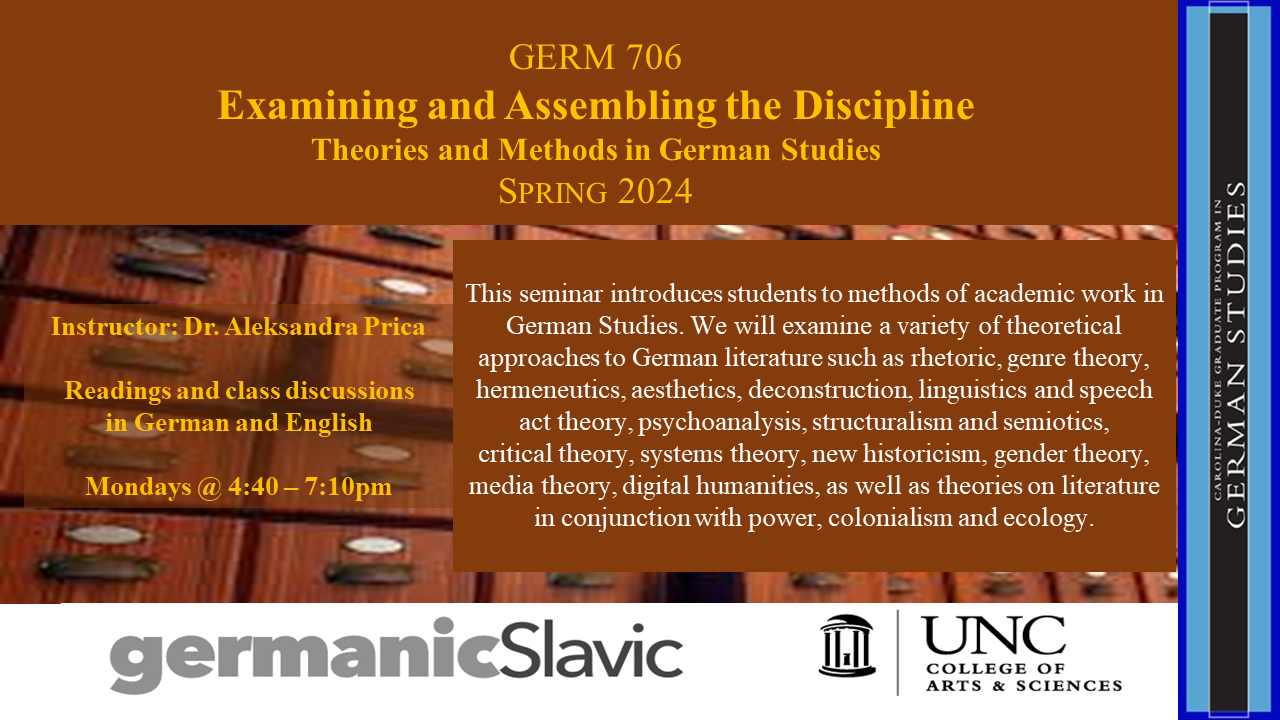
GERM 706 Examining and Assembling the Discipline: Theories and Methods in German Studies.
This seminar introduces students to methods of academic work in German Studies. We will examine a variety of theoretical approaches to German literature such as rhetoric, genre theory, hermeneutics, aesthetics, deconstruction, linguistics and speech act theory, psychoanalysis, structuralism and semiotics, critical theory, systems theory, new historicism, gender theory, media theory, digital humanities, as well as theories on literature in conjunction with power, colonialism, and ecology.
Readings and class discussions in German and English.
Prica. M 4:40 PM – 7:10 PM. Carolina Campus
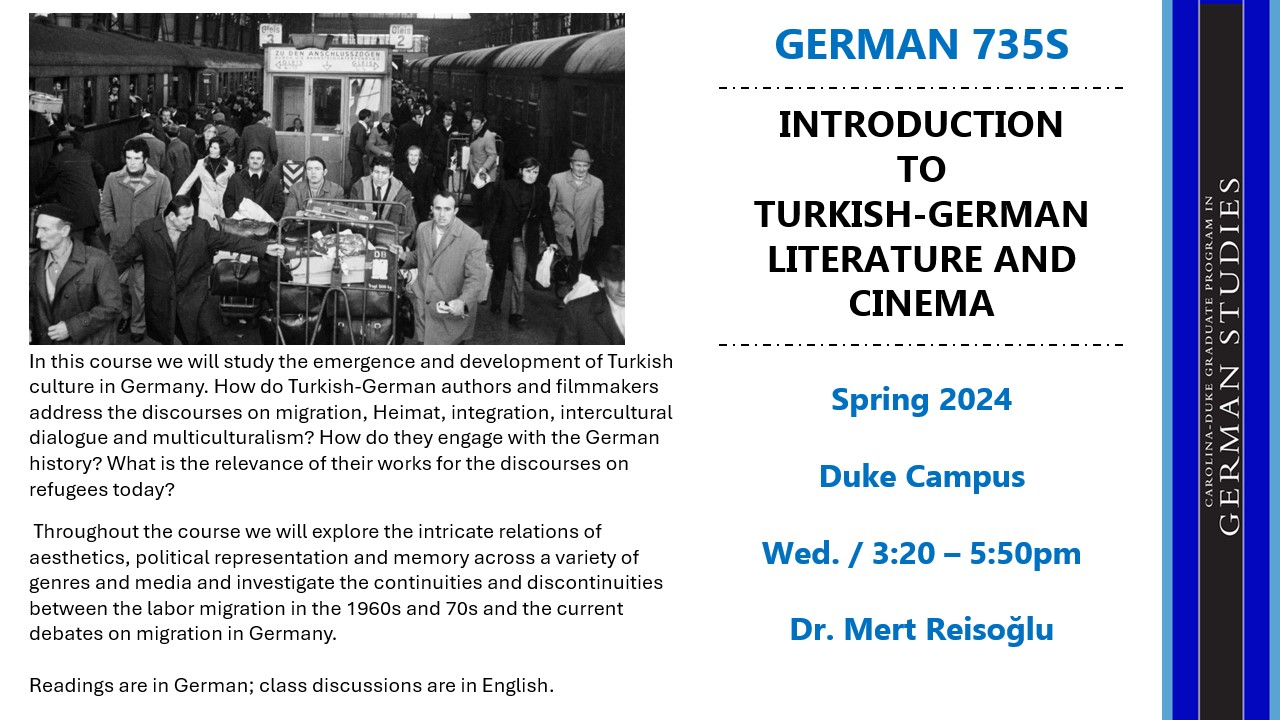
GERMAN 735S Introduction to Turkish-German Literature and Cinema.
In this course we will study the emergence and development of Turkish culture in Germany. How do Turkish-German authors and filmmakers address the discourses on migration, Heimat, integration, intercultural dialogue and multiculturalism? How do they engage with the German history? What is the relevance of their works for the discourses on refugees today?
Throughout the course we will explore the intricate relations of aesthetics, political representation and memory across a variety of genres and media and investigate the continuities and discontinuities between the labor migration in the 1960s and 70s and the current debates on migration in Germany.
Readings in German; class discussions in English.
Reisoglu. W 3:20 PM – 5:50 PM. Duke Campus
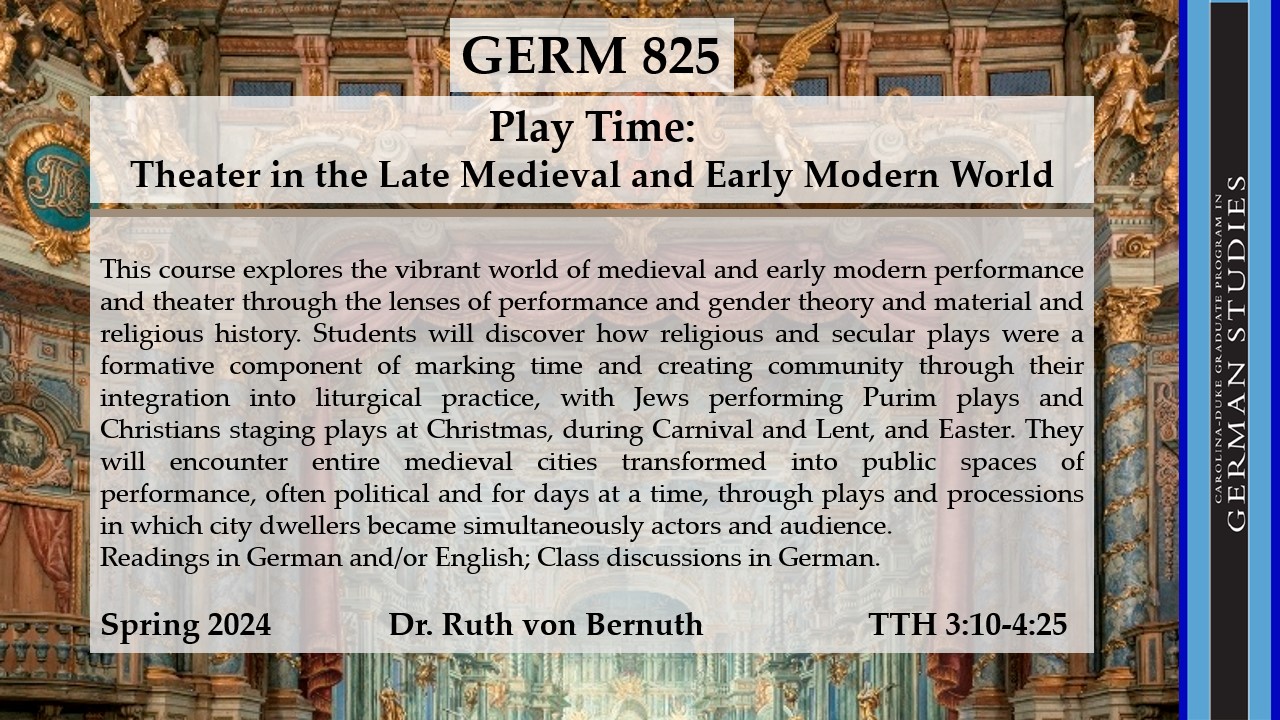
GERM 825 Play Time: Theater in the Late Medieval and Early Modern World.
Civic performances, ritual enactments, dramatic stagings, plays, and public spectacles were a ubiquitous feature of life in German-speaking lands long before the creation of the modern theater in the 18th century. This course explores the vibrant world of medieval and early modern performance and theater through the lenses of performance theory; gender theory; philology; material history; and religious history (Christian and Jewish). Students will discover how religious and secular plays were a formative component of marking time and creating community through their integration into liturgical practice, with Jews performing Purim plays and Christians staging plays at Christmas, during Carnival and Lent, and Easter. They will encounter entire medieval cities transformed into public spaces of performance, often for days at a time, through plays and processions in which city dwellers became simultaneously actors and audience. They will learn about the ideological and political battles of the Reformation by reading dramas that present, in effect, arguments in support of the Reformed cause. They will reflect on the origins of modern notions of the theater, and the reasons that traditional Germanistik has excluded medieval and early modern works from its definitions of theater, by reading the first German opera Dafne, an early enlightenment play by the early female playwright Luise Gottsched, and a Yiddish play by Aaron Halle Wolfssohn.
Readings in German and/or English; class discussions in German.
Von Bernuth. TTH 3:10 PM – 4:25 PM. Carolina Campus

